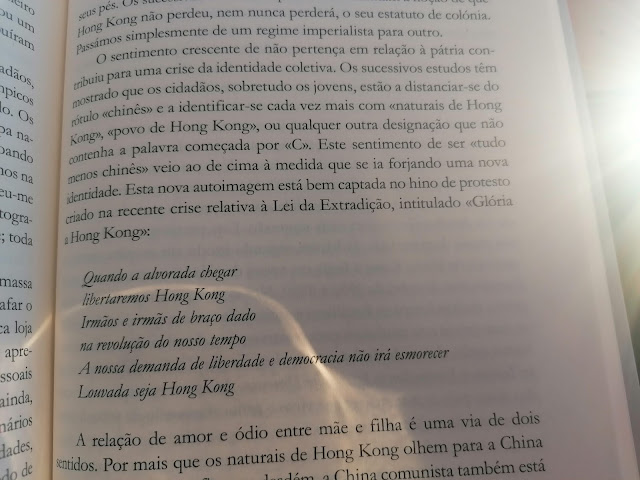Identity
The erosion of democratic guarantees established under the “one country, two systems” policy has made young Hong Kongers more keenly aware of their unique identity, experts say at HKS Forum. But some also see caution by Chinese leaders and a desire to avoid a repeat of Tiananmen Square. https://ash.harvard.edu/new-uniquely-hong-kong-based-identity-behind-protests
Hong Kong’s Protests Have Cemented Its Identity
Chinese authorities have long sought to sway Hong Kongers, but more and more, residents of the city see it as being distinct from the mainland. https://www.theatlantic.com/international/archive/2019/08/hong-kong-china-protest-identity/596320/
Almost nobody in Hong Kong under 30 identifies as “Chinese”https://www.economist.com/graphic-detail/2019/08/26/almost-nobody-in-hong-kong-under-30-identifies-as-chinese
Hong Kong people have long suffered an identity crisis. It was first noticed in the 1980s when China and Britain were negotiating over the future of Hong Kong. At that time, prominent academic Helen Siu wrote numerous columns to analyse and discuss the identity issues of Hong Kong people. Albert Cheng King-hon is a political commentator
Due to increasing social and political tensions between Hong Kong and Mainland China and desinicisation in the territory, a recent poll found that most Hong Kong residents identify themselves as 'Hongkongers' (source needed), with an "estimated" figure of over 40%, while less than 27% identify themselves as 'Hongkongers in China' and less than 18% as 'Chinese'.[19][20] The identity crisis is further heightened by demographic changes, in which Chinese immigrants made up of a considerable portion of the population post-1997.
2011: The latest surveys conducted by the Public Opinion Programme (POP) at the University of Hong Kong show that if we use a dichotomy of "Hong Kong citizens" versus "Chinese citizens" to measure Hong Kong people's ethnic identity, the proportion of people identifying themselves as "Hong Kong citizens" outnumbers that of "Chinese citizens" both in their narrow and broad senses, by about 20 to 30 percentage points, while the percentage of those identifying themselves as "Chinese citizens" has dropped to a new low since 2000, now at 17%. Figures also show that in terms of absolute rating, people's identification with "Hong Kong citizens" has reached a ten-year high, while that of "Chinese citizens" has dropped to a 12-year low
Economic upheaval and a surge of immigration put Hong Kong’s traditional identity under tremendous pressure.
As a result, many developed a new kind of identity — one that is more strongly felt as well as narrower and more combative. Being Hong Konger and being Chinese, long complementary, suddenly came to feel exclusive. This turned the region into a powder keg that one scholar called “one country, two nationalisms” — an allusion to the “one country, two systems” policy that was meant to protect Hong Kong’s status within China. Identity crises often begin with a loss of status. Something causes the social hierarchy to reshuffle, with some social class losing out. Its members, feeling threatened, rally behind their group identity, causing it to feel more important just as it is also in doubt. In Hong Kong, this started with an influx of money from mainland China’s ballooning economy. Hong Kong became China’s hub for financial services and a conduit for trade. And newly rich Chinese poured money into local real estate. They have become more skeptical of mainland China and people who come from there, Mr. Wong found. They hold more tightly to Hong Konger identity. And many joined Hong Kong’s nascent localist movement, which advocates political autonomy and cultural distinctiveness from mainland China. “You cannot have two national identities that represent the same territory,” Mr. Yau said, adding that, in the eyes of many here, “it’s become a time when we need to choose.” https://www.nytimes.com/2019/09/27/world/asia/hong-kong-protests-identity.html
One Country, Two Nationalisms: Center-Periphery Relations between Mainland China and Hong Kong, 1997–2016
Finally, if Beijing continues its rapid assimilation plans to fully erode Hong Kong autonomy, what is Hong Kongers’ backup plan to preserve our own unique cultural identity? Ideas about rebuilding Hong Kong as an independent city-state elsewhere, away from China, have been conceived as early as in the 1980s. But in the era of the digital revolution, the new “Hong Kong” may not be confined to a singular geographical location.A universal Hong Konger identity among the overseas pro-democracy Hong Kongers has been developing since the protests. This identity can serve as a force attracting all Hong Kongers in the world and building a virtual city whose citizens have no geographic barriers, pursue any livelihood they desire, and connect to the YEC through the internet. Dr. Simon Shen is the Founding Chairman of GLOs (Glocal Learning Offices), an international relations start-up company. He also serves as an adjunct associate professor in the University of Hong Kong, Chinese University of Hong Kong and the Hong Kong University of Science and Technology, and associate director of the Master of Global Political Economy Programme of the CUHK. https://thediplomat.com/2020/05/how-the-yellow-economic-circle-can-revolutionize-hong-kong/


Comments
Post a Comment